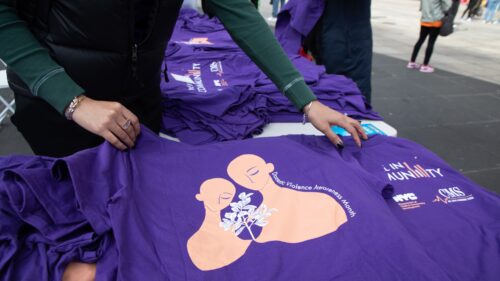Ending intimate partner violence calls for a multifaceted approach.
By Jessica Resnick, Senior Program Associate on our Gender and Family Justice team
Despite the devastating impacts of intimate partner violence on communities across the country, traditional responses to it often fall short of what survivors and the people most impacted really need. In working with survivors of intimate partner violence in New York City and nationwide, we’ve seen firsthand that community safety begins with safety in the home and in our intimate relationships.
That’s why we take a multifaceted approach to intimate partner violence—one that works in both courts and communities, that addresses the underlying causes of violence, and that engages survivors, people who have caused harm, and communities as a whole.
The RISE Project is a prime example of that vision, mobilizing communities across New York City to take a stand against intimate partner violence and gun violence. Part of the city’s Crisis Management System, our RISE team supports people experiencing abuse by helping them plan for their safety and get access to long-term resources. They also go beyond immediate crisis responses, uprooting violence through education on healthy relationships, safe spaces for healing, and programs that promote behavioral change for people who have caused harm.
Those initiatives are a direct response to the lived experiences of survivors, who often report that they want resources that hold their partners and ex-partners accountable in ways that help them make lasting change. To meet that need, many communities offer abusive partner intervention programs—programs that engage people who’ve caused harm to take responsibility for their choices and get beyond abusive behaviors. Yet these programs too often only reach people who are involved in the criminal justice system, leaving gaps in support for the countless survivors who are hesitant to turn to law enforcement.
In response to a demand from survivors and advocates for more holistic programs, New York City has embraced multiple pathways to accountability, safety, and healing—offering much-needed support and opportunities for change both inside and outside of the courts.
In the justice system, our Gender and Family Justice team works to create and strengthen educational classes for people who have caused harm in their relationships. The Tactics and Choices program engages people in New York City’s Supervised Release Program, an alternative to bail that keeps people in their communities and connected to services while they wait for their court case to be resolved. It offers a pathway to accountability and behavioral change at an earlier stage in the criminal process than many other intervention programs, addressing the unique risks and needs of people charged with offenses involving intimate partner violence.
With input from survivors and experts, the team also helped create the Dignity and Respect program, a court-mandated class that fosters accountability and behavioral change through a trauma-informed, culturally responsive lens. Dignity and Respect gives people who have caused harm an opportunity to examine harmful thoughts, beliefs, actions, and values and embrace healthier ways of being. Many participants in both programs have expressed a desire to get access to ongoing resources even after completing their courses.
That’s why our teams work to open paths to accountability and change outside of the court system as well. Drawing from its core mission of responding to community needs, the Red Hook Community Justice Center launched Healing Connections, a restorative justice program that invites people to explore their own experiences of gender norms, trauma, and structural violence in connection with the harm they’ve caused in their relationships. At the end of the program, the Community Justice Center connects participants to other resources in the community where they can continue the hard work of self-reflection and education.
Our RISE team also offers voluntary programming rooted in principles of restorative justice for people who have caused harm with the Respect and Responsibility program. With support from peers and people with similar life experiences, the program provides a safe space for participants to reflect on the root causes of their harmful behaviors and get access to services that set them up for better futures, from mental health treatment to support with housing and food insecurity. Participants have shared that the program helped them identify behaviors they need to change while strengthening their own sense of self, support networks, and their understanding of abuse. One participant even came back to the RISE team for some time as an outreach worker, using their own experience of transformation to nurture change in others.
New York City has taken another crucial step towards ending intimate partner violence by making this vital programming free, eliminating financial burdens that keep people from accessing opportunities for meaningful change and accountability. By offering these much-needed services at every stage of the justice system and outside of it, we can build a safer, healthier future for survivors, people who have caused harm, and communities as a whole.
How We Can Help
Our Gender and Family Justice team provides training and guidance to communities nationwide to help them enhance their responses to intimate partner violence, both in working with survivors and in strengthening accountability and engagement for people who cause harm. We’ve developed a set of guiding principles to inform abusive partner intervention programs at all stages, and often encourage communities to engage those with lived experience locally to guide recommendations.
For more information on the multiple pathways framework, read our article originally published in Families in Society: The Journal of Contemporary Social Services, “Building Multiple Pathways to Healing, Safety, and Accountability to Address Intimate Partner Violence.”
You can also visit our clearinghouse of materials for people working in abusive partner intervention programs.
